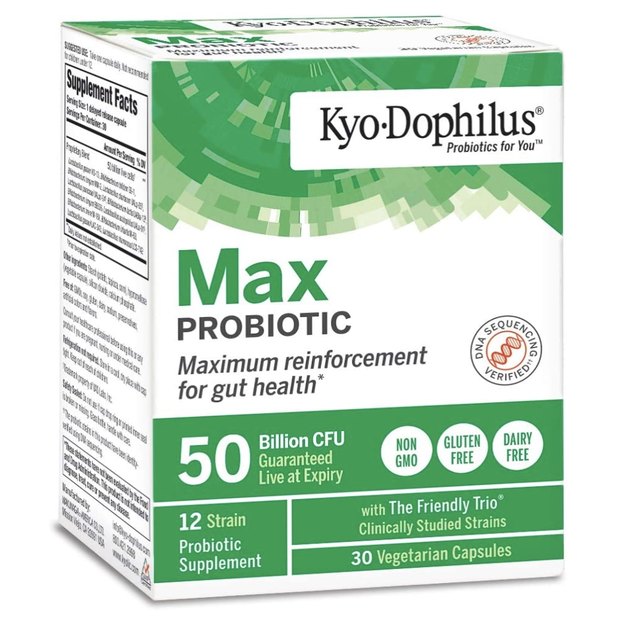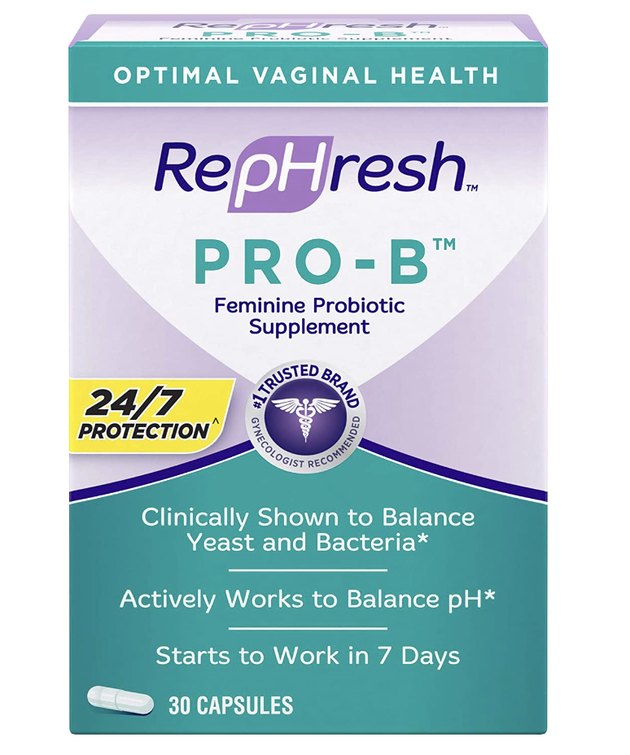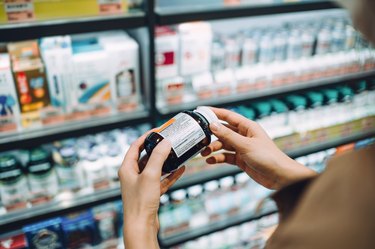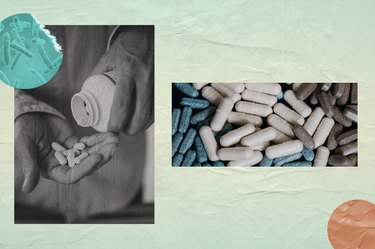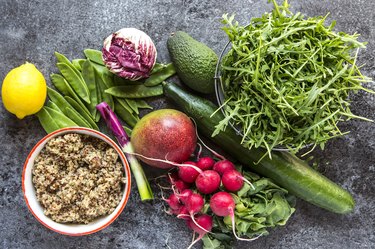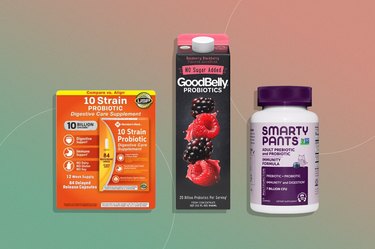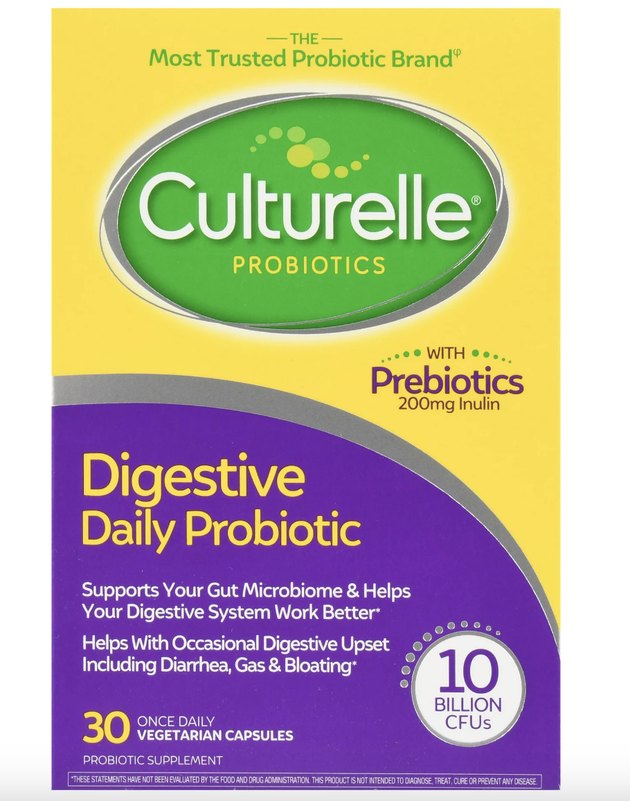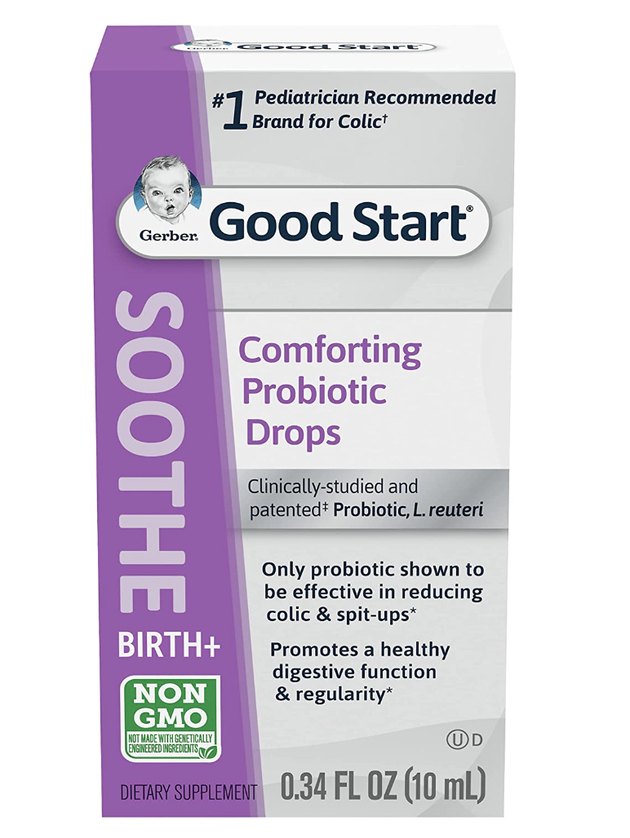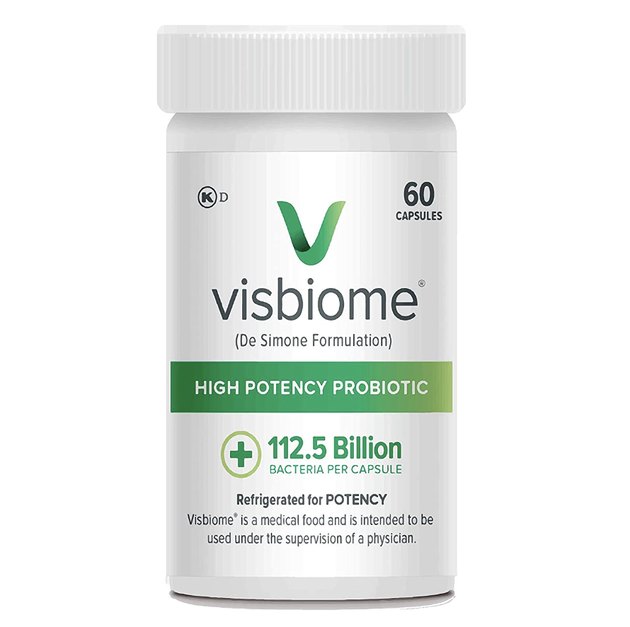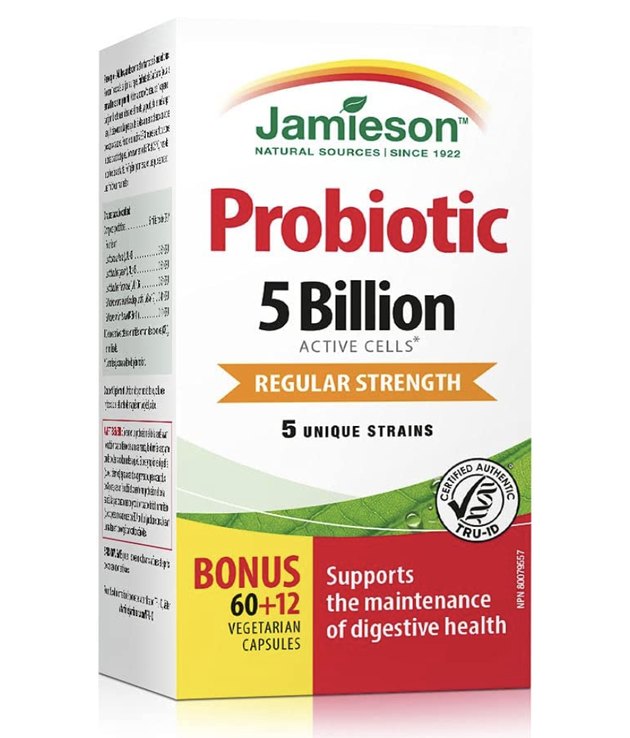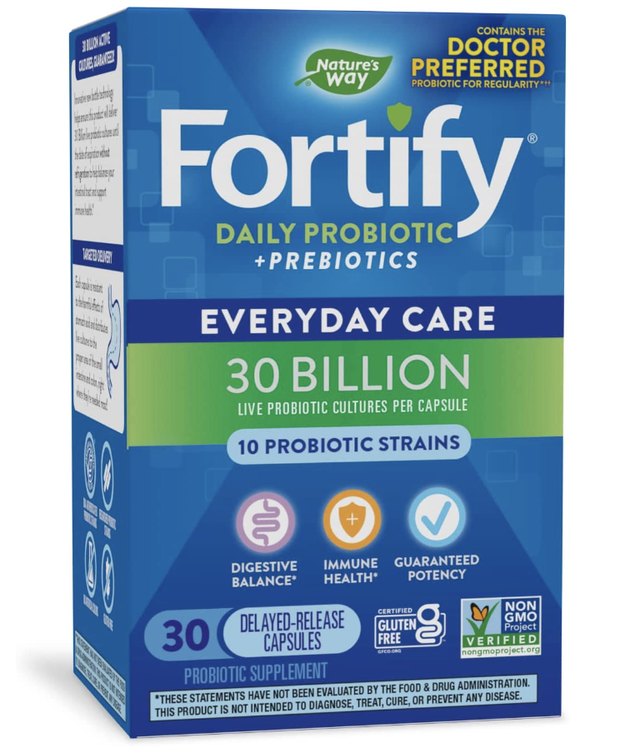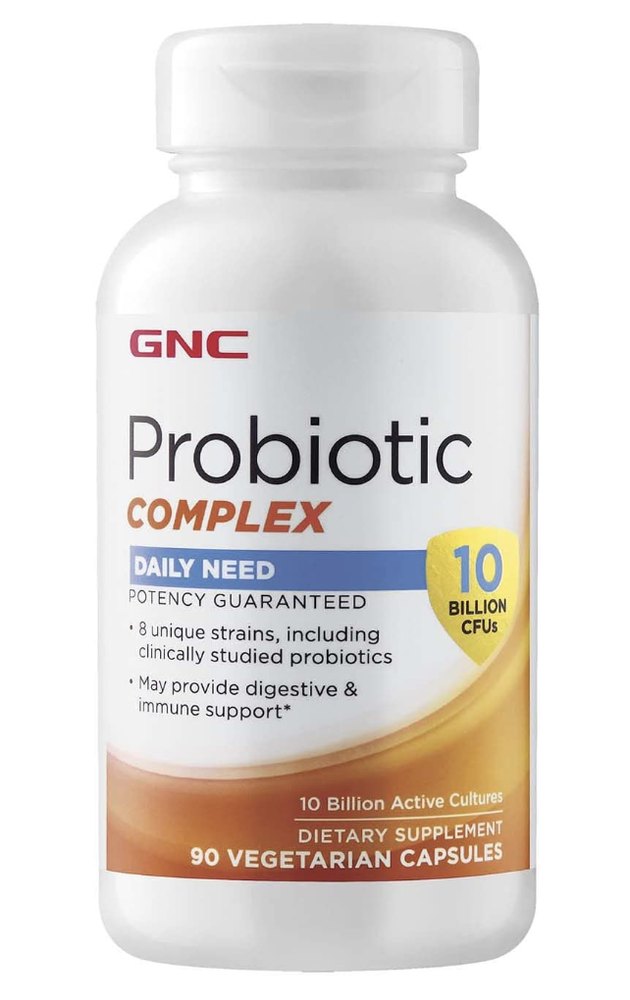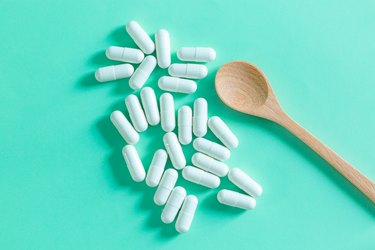
Probiotics — aka friendly bacteria and yeast — reside in your body, delivering all sorts of health benefits. Add probiotic-rich foods like yogurt and kimchi to your diet and you'll naturally take in these microorganisms.
But if those foods aren't appealing, you can also turn to supplements.
Video of the Day
Video of the Day
"Many of my patients have found benefit with probiotics," Bryan Curtin, MD, director of the Center for Neurogastroenterology and GI Motility at Mercy Medical Center, tells LIVESTRONG.com.
"Probiotics cause benefit by multiple mechanisms," Dr. Curtin explains, including suppressing the growth of bad bacteria, improving the gut's natural defenses and supporting the immune system.
But much more remains to be known when it comes to the positive effects of probiotics. "The major GI societies in the U.S. have made position statements that it is unclear what strains, dosing and regimens are beneficial for the general use of probiotics," Dr. Curtin says.
Our Picks
- Best for Overall Health: Kyo-Dophilus Max Probiotics ($32.95, Amazon)
- Best for Women: Rephresh Pro-B Probiotic Supplement for Women ($19.08, Amazon)
- Best for Diarrhea: Culturelle Digestive Health Daily Probiotic Capsules ($17.47, Walmart)
- Best for Constipation: Gerber Soothe Probiotic Colic Drops ($33.49, Amazon)
- Best for IBS: Visbiome High Potency Probiotics ($73.95, Amazon)
- Best for Weight Loss: Jamieson Probiotics 5 Billion ($16.90, Amazon)
- Best for Brain Health: Nature’s Way Fortify Daily Probiotic ($13.13, Amazon)
- Best for Immunity: GNC Probiotic Complex Daily Need ($26.59, Amazon)
How We Chose
We tapped gastroenterologists to share their top picks for the best probiotics. Each product was chosen based on the following criteria:
- Quality
- Effectiveness
- Cost
- Species of bacteria
A Note on Language
Here at LIVESTRONG.com, we carefully consider language surrounding sex and gender. We try to avoid language that implies a sex or gender binary in favor of more inclusive language, but sometimes we include words like "men" or "women" when quoting an expert, product details or other original source material for the sake of accuracy, as is the case in this story.
1. Kyo-Dophilus Max Probiotics
If you're looking to improve your overall digestive health, a supplement with many strains may be appealing.
"I typically recommend supplements with multiple species in it, helping to promote the most diversity in the microbiome possible; but for some, single-strain supplements may be more appropriate," says gut health dietitian Laura Poe, RD.
The instructions call for you to take one of these large capsules daily. This supplement is vegetarian and does not need to be refrigerated. It contains many strains of probiotics, including Lactobacillus gasseri, Bifidobacterium bifidum, Lactobacillus plantarum and more.
Warning
The world of probiotics can be overwhelming, which is why the experts we spoke to recommended speaking with your doctor before starting one.
“Despite their wide availability, probiotic supplements are not entirely benign agents,” Dr. Curtin says — and not everyone should take one, he notes. He recommends trying them for a short period of time (2 to 4 weeks) as opposed to taking them daily for several years.
2. RepHresh Pro-B Supplement for Women
Some research suggests probiotics may help ward off vaginal infections, per a December 2020 report from ConsumerLab, which provides independent test results for health and nutrition products.
This is one area where more studies are needed to sort out what's possible. Lactobacillus rhamnosus GR-1 appears to be the best probiotic for vaginal health, according to Harvard Health Publishing.
This is a ConsumerLab top pick for preventing vaginal infections. The combination of strains present in this supplement (which includes Lactobacillus rhamnosus GR-1) might reduce "bad" bacteria in the vagina, per the ConsumerLab report.
If you're looking for the best probiotics for men, try out Ancient Nutrition's SBO Probiotics Men ($35.96), which may help support gut health and energy.
3. Culterelle Digestive Health Daily Probiotic Capsules
"Probiotics are particularly helpful with diarrhea, especially after recent antibiotic usage," Dr. Curtin says. Lactobacillus rhamnosus GG and Saccharomyces boulardii both help cut down on antibiotics-associated diarrhea, which affects 30 percent of people who take antibiotics, per the National Institutes of Health (NIH).
Not only does this soy-free prebiotic fiber supplement ease diarrhea that comes with taking antibiotics, but it can also help with traveler's diarrhea, per ConsumerLab. This makes it one of the best probiotics for gut health on the market.
Begin taking when you start your antibiotics course and continue for a full week after you've completed the script, according to the ConsumerLab report.
4. Gerber Soothe Probiotic Colic Drops
Struggling to go can be uncomfortable. "Probiotics can be safely tried for mild constipation, in addition to adequate hydration, fiber intake and magnesium supplementation," Dr. Curtin says.
Compared to a placebo, Lactobacillus reuteri helps improve the frequency of bowel movements, per a small December 2014 study in the Journal of Gastrointestinal and Liver Diseases. (The same effect was seen in previous studies in children.)
As well as being effective for colic in infants, taking these drops — which contain Lactobacillus reuteri, a good bacteria — twice a day might help with constipation in adults, per ConsumerLab. This can also make it a good probiotic for bloating and gas, which can occur when you're constipated.
5. Visbiome High Potency Probiotics
Probiotics may ease IBS symptoms, according to the Canadian Society of Intestinal Research, which notes that more research will help understand the link a bit better.
Strains of Lactobacillus bacteria — including Lactobacillus plantarum, Lactobacillus bulgaricus and Lactobacillus acidophilus — may help with IBS symptoms, per the Canadian Society of Intestinal Research.
Taking this large capsule with 112.5 billion CFUs may help with bloating for some forms of IBS, per ConsumerLab. It's their top pick for both reducing bloating in diarrhea-predominant IBS and for pouchitis (inflammation that can occur after surgery for ulcerative colitis, per the Mayo Clinic). Note that this product contains milk.
Tip
Although research is promising, the American Gastroenterological Association (AGA) recommends people with IBS consider holding off on taking probiotics because supplements can be pricey and there simply isn’t enough evidence to support that they’ll be beneficial (and won’t lead to harm).
6. Jamieson Laboratories Probiotics 5 Billion
People with overweight or obesity have lower bacterial diversity in their gut, per a June 2018 analysis in The BMJ.
Which probiotic is best for weight loss? There are certain strains that may be beneficial: Lactobacillus gasseri SBT 2055 and Lactobacillus rhamnosus ATCC 53103, as well as a combination of L. rhamnosus ATCC 53102 and Bifidobacterium lactis Bb12. Both are linked to reduced body weight and weight gain, per a March 2014 review in Beneficial Microbes.
However, clinical trials have shown inconsistent results, per the NIH. In addition to particular strains, your weight and sex may play a role in how effective probiotics are.
A single daily capsule, which is medium- to large-sized, contains Lactobacillus gasseri as well as several other strains.
7. Nature's Way Fortify Daily Probiotic
The gut plays a major role in your mood — so much so that it's referred to as your "second brain." The gut and your brain communicate with each other — that means psychological interventions may help with gut-related problems, per Johns Hopkins Medicine.
And the reverse may be true as well: One small study found taking probiotics is linked to easing negative thoughts due to a sad mood, per August 2015 research in Brain, Behavior, and Immunity.
And probiotics are linked to helping with symptoms of psychological conditions (such as depression and anxiety), per an October 2016 review in the Journal of Neurogastroenterology and Motility that looked at both animal and human studies.
Taking Lactobacillus acidophilus, Lactobacillus casei and Bifidobacterium bifidum were observed to ease depression symptoms in people with major depressive disorder in a small March 2016 study in Nutrition. More research is needed to understand this gut-brain relationship.
This one daily capsule contains several probiotic strains (including the three called out in the Nutrition study).
8. GNC Probiotic Complex Daily Need
A surprising amount — an estimated 70 percent — of immune cells are found in your gut, per an older but frequently cited September 2008 article in Clinical and Experimental Immunology. What happens in your gut affects many parts of your body, including the immune system.
While more research is needed in this area, there's evidence probiotics with the Lactobacillus and Bifidobacterium strains are linked to reduced symptoms of colds and upper respiratory infections, per ConsumerLab.
For example, in one study, people prone to getting colds in the winter were divided up into two groups. One group drank a probiotic drink with Lactobacillus paracasei, Lactobacillus casei and Lactobacillus fermentium while the other group had a placebo drink without any probiotics. People in the probiotic drink group had fewer upper respiratory infections and flu-like symptoms, per the June 2018 study in Synthetic and Systems Biotechnology.
Taking probiotics for inflammation is also another potential benefit: Compared to a group taking a placebo, older adults taking a probiotic supplement had more anti-inflammatory markers, per an April 2015 study in the Journal of the American College of Nutrition.
You'll take one large capsule a day with food. This supplement is vegetarian and both glucose- and lactose-free. It contains Lactobacillus acidophilus (CUL 60 and CUL 21), Bifidobacterium bifidum (CUL 20) and Bifidobacterium animalis (CUL 34).
4 Things to Look for in a Quality Probiotic
If you browse online or peruse the vitamins and supplements aisle in a drug store, you'll find many, many options. Here's what to keep in mind as you choose a probiotic supplement.
1. CFUs
CFU stands for colony-forming units and it's "an estimate of the number of viable cells capable of forming new bacterial colonies in the gut," says Carielle Nikkel, RDN, vice president of nutrition at Persona Nutrition.
"Doses of 5 to 20 billion CFU per day are shown to be effective in supporting digestive and immune health," she says.
Some products will tout that they have "megadoses" of probiotics, Nikkel points out — but higher CFUs don't always equate to better or more health benefits, per the NIH.
2. Brand and Certification
Choose a reputable brand before making a purchase. "Look for a brand that has doctors, dietitians and other nutrition experts working behind the scenes," Nikkel recommends.
You can also look for third-party certification on the container from organizations including:
- United States Pharmacopeia
- ConsumerLab
- NSF
3. Additives
"When you read the label, look for additives or allergens in the probiotic capsules that may not work for your body — especially if you have food sensitivities or dietary restrictions," Poe says.
If the information isn't available there, you can check on the company's website or reach out for more information, she says.
4. Genus, Species and Strain
Along with an alphanumeric, bacteria are identified by their genus, species and strain, per the World Gastroenterology Organisation Global Guidelines.
Within each genus, there are many species and strains, per the International Probiotics Association. These are presented in order from the broadest category to the most specific. So, for Lactobacillus rhamnosus GG, the genus is Lactobacillus, the species is rhamnosus and the strain is GG.
Here are some of the most common genera found in probiotic supplements, per the NIH:
- Lactobacillus: This may help with diarrhea, as well as allergies, stomach pain and constipation, per the U.S. National Library of Medicine (NLM).
- Bifidobacterium: This good bacteria may help with constipation and airway infections, per NLM.
- Saccharomyces: This yeast may be effective against diarrhea and stomach pain, per a December 2020 report from ConsumerLab.
- Streptococcus: This is effective with some forms of diarrhea, per ConsumerLab.
- Bacillus: This helps with abdominal pain, bloating and constipation, per ConsumerLab.
"The most important thing to look for is the right species of bacteria (or yeast) tailored to your specific health needs," Poe says.
- Harvard Health Publishing: "Health benefits of taking probiotics"
- Office of Dietary Supplements: "Probiotics"
- World Gastroenterology Organisation Global Guidelines: "Probiotics and prebiotics"
- Consumer Labs: "Probiotic Supplements Review (Including Pet Probiotics)"
- Harvard Health Publishing: "Should you use probiotics for your vagina?"
- Journal of Gastrointestinal and Liver Diseases: "https://pubmed.ncbi.nlm.nih.gov/25531996/"
- Canadian Society of Intestinal Research: "Probiotics for Irritable Bowel Syndrome"
- American Gastroenterological Association: "AGA does not recommend the use of probiotics for most digestive conditions"
- Mayo Clinic: "Pouchitis"
- The BMJ: "Role of the gut microbiota in nutrition and health"
- Beneficial Microbes: "The development of probiotic treatment in obesity: a review"
- Johns Hopkins Medicine: "The Brain-Gut Connection"
- Brain, Behavior, and Immunity: "A randomized controlled trial to test the effect of multispecies probiotics on cognitive reactivity to sad mood"
- Journal of Neurogastroenterology and Motility: "Effect of Probiotics on Central Nervous System Functions in Animals and Humans: A Systematic Review"
- Annals of Medicine: "Effects of probiotics consumption on lowering lipids and CVD risk factors: a systematic review and meta-analysis of randomized controlled trials"
- Clinical and Experimental Immunology: "Allergy and the gastrointestinal system"
- Synthetic and Systems Biotechnology: "Prospective study of probiotic supplementation results in immune stimulation and improvement of upper respiratory infection rate"
- Journal of the American College of Nutrition: "Lactobacillus gasseri KS-13, Bifidobacterium bifidum G9-1, and Bifidobacterium longum MM-2 Ingestion Induces a Less Inflammatory Cytokine Profile and a Potentially Beneficial Shift in Gut Microbiota in Older Adults: A Randomized, Double-Blind, Placebo-Controlled, Crossover Study"
- U.S. National Library of Medicine: "Lactobacillus"
- NLM: "Bifidobacterium"
- NLM: "Saccharomyces"
- International Probiotics Association: "Essentials"
